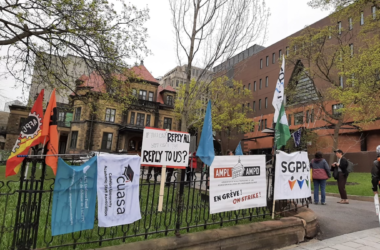Thousands gathered outside Premier Jean Charest’s Montreal office to protest the recently approved Bill 115 on October 18. The legislation grants students access to the English public school system after spending three years in a private non-subsidized English school and after having followed a so-called “genuine educational pathway,” which protesters feel is a threat to Francophone culture.
After a nightlong debate in the Quebec national assembly, the bill was passed early Tuesday morning, by a vote of 61 to 54.
The law passed only days before the end of the Supreme Court’s yearlong deadline to find an alternative to the previously approved Bill 104, which was found to be in violation of the Charter of Rights and Freedoms.
The bill also replaces Bill 103, which was proposed earlier in the year and contained essentially the same elements.
“[Bill 115] allows the purchase of a right, and in a democracy that should not exist. Attending an English private school now legalizes the access to an English public school, public meaning paid by our taxes,” said Gilles Lefebre, a protester at the rally. “We are conscious that we are a Francophone minority in North America, so if we want to survive, there has to be a legislation that protects our language.”
The so-called “bridging schools,” English private and unsubsidized schools, have been considered to be a “loophole” in Quebec’s Charter of the French Language (Bill 101), which limits access to the English public system to children whose parents attended English-language schools in Canada.
“When we established Bill 101, we collectively decided that public schools would function in French for everyone, with minor exceptions for First Nations and for the historically Anglophone minority,” said Mario Beaulieu, the president of St-Jean-Baptiste Society of Montreal, in his opening speech at the rally. “The only solution is to apply Bill 101 to English non-subsidized private schools. That’s what we want and that’s what we will have.”
As the protesters chanted “Montreal in French” on a packed McGill College Avenue holding signs reading “Vive le Quebec Français” and “No to Bill 103”, Beaulieu expressed his discontent with Charest’s Liberal government claiming that it is abandoning the defence of the French language.
“Mr. Charest and all of you who find it radical to ensure the future of French, we are here to tell you that you will no longer let you move us backwards, we are done feeling guilty of existing, enough is enough, from now on it is forward that we are moving, forward in French,” said Beaulieu.
According to Beaulieu, education should be provided in the majority’s language. He said Bill 101 needs to be reinforced.
“At this point, Bill 101 has suffered over a dozen modifications that weaken it in all of its aspects. English in Montreal has now a power of attraction five times greater than that of French,” he said. “French is what makes us a nation. If we want to include all of our citizens, no exceptions, it will take a law that applies to all of us equally.”
Several organizations including Imperative French and the Commission of National Syndicates (CSN) were among the groups present at the rally.
M. Fernand, a member of Imperative Montreal, supported Beaulieu’s solution of incorporating “bridging schools” to the Charter of the French Language.
“All we want is that everyone who arrives in Quebec and whose first language is neither English nor French, to be integrated in the French school system, whether it’s public or private,” she said. “Anglophones have the right to attend English school and I agree with that. We simply want immigrants to be obliged to go to school in French because we really are a small minority.”
Jonathan Goldbloom, a spokeperson for the Quebec Association of Independent Schools was satisfied with the outcome.
“We are pleased that it will provide us with access to certain students who were not eligilble to attend our schools [under the previous legislation].”
However, Goldbloom argued for more precision.
“We feel that the regulations that they put forward are a little too complicated and unclear in terms of helping parents as well as schools plan, but Bill 115 is definitely a step in the right direction.”
At the national assembly, Premier Jean Charest ignored opposition from both Francophone and Anglophone groups and referred to Bill 115 as “pragmatic.”








